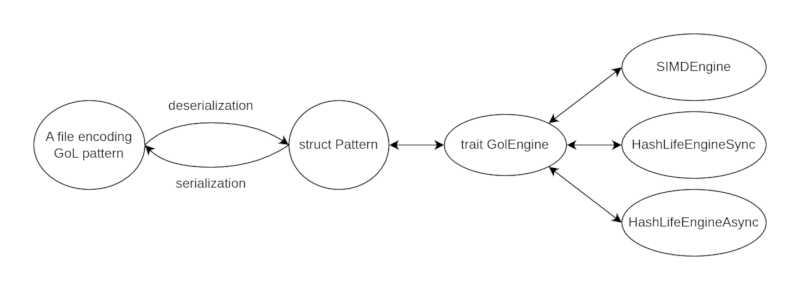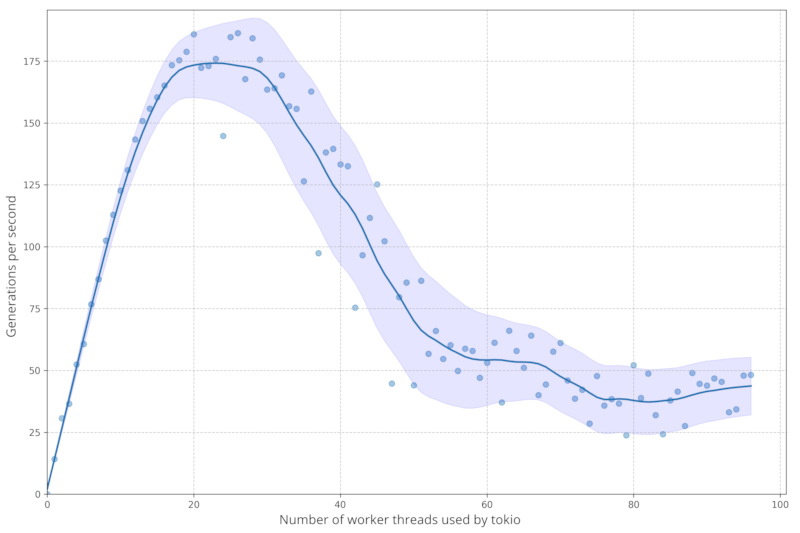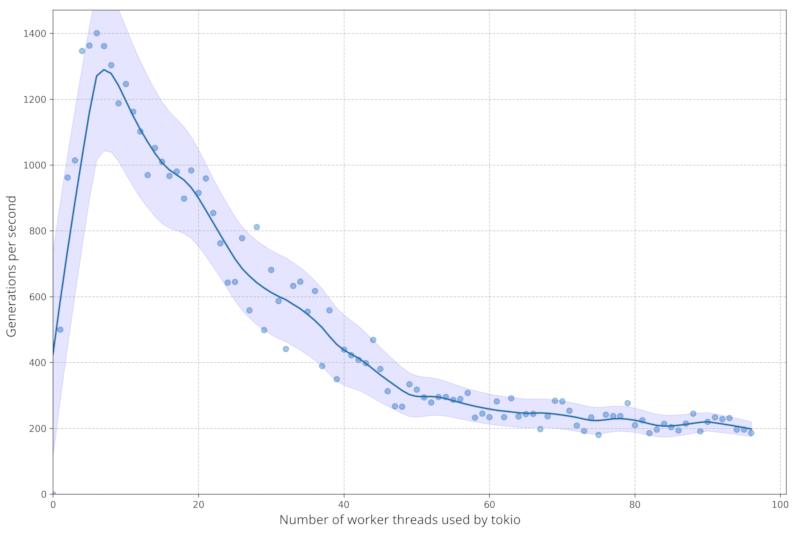2 releases
| new 0.1.1 | May 21, 2025 |
|---|---|
| 0.1.0 | May 21, 2025 |
#107 in Concurrency
35 downloads per month
280KB
6K
SLoC
GoL Engines: top-performance Conway's Game of Life update algorithms, including parallel hashlife
Moved from https://github.com/das67333/conway/
Overview
The repository includes several cross-platform update algorithm implementations for Conway's Game of Life (focusing on HashLife and StreamLife):
- SIMDEngine is a relatively simple engine performing updates in a pattern-oblivious way: it stores the field in packed (1 bit per cell) row-major format and updates a consecutive group of cells in a few dozens of CPU instructions. It currently updates 64 cells at once and can be easily changed to conditionally use AVX-like instructions.
- HashLifeEngineSmall is similar to the one in lifelib --- it uses a hashtable with a chaining collision handling technique and stores nodes corresponding to squares of different sizes separately. Nodes of different sizes are indexed independently, zero index corresponds to the blank node. Leaf size is $8\times8$, hash function is Golly-based
let h = nw * 5 + ne * 17 + sw * 257 + se * 65537; h += h >> 11. - StreamLifeEngineSmall is based on HashLifeEngineSmall; it caches results of updates in a single standard hashtable (which is open-addressing) with a fast hash function from ahash.
- HashLifeEngineSync uses a single pre-allocated open-addressing hashtable with linear probing. Unlike HashLifeEngineSmall, the hashtable never grows. If the hashtable reaches load factor 0.75 during the update, the algorithm temporarily "poisons" the hashtable to quickly terminate the update, clears the hashtable and loads the configuration of cells it stored before the update.
- StreamLifeEngineSync is like StreamLifeEngineSmall, but it is based on HashLifeEngineSync.
- HashLifeEngineAsync is the HashLifeEngineSync that was modified to thread-safely execute in parallel. It uses asynchronous runtime tokio. New asynchronous tasks (lightweight threads) for recursive calls are spawned only when processing a square not smaller than a given threshold (
MIN_TASK_SPAWN_SIZE_LOG2) and total number of running asynchronous tasks is smaller thanMAX_TASKS_COUNT. - StreamLifeEngineAsync uses a preallocated open-addresssing hashtable that never grows (another one is in the internal HashLifeEngineAsync). If it overfills, the algorithm also "poisons" the hashtables and terminates the update. Recursive calls to the update function can spawn new asynchronous tasks, like in HashLifeEngineAsync.
CLI interface uses parallel implementations (HashLifeEngineAsync and StreamLifeEngineAsync).
Two topologies of the field are supported: Unbounded and Torus (the latter on a $2^n\times2^n$ square grid).
Architecture
The Pattern structure is designed to be a fast and compact checkpoint for the engines. It stores a configuration of cells in quadtree form (like HashLife).
Features
- Parallel HashLife and StreamLife!
- Crossplatform
- Right now only supports patterns with B3/S23 rule
- Can read and write .rle, .mc and .mc.gz file formats
- Can efficiently metafy patterns (for example, create multi-level OTCA metapixel)
Building
Assuming you have Rust installed (see https://rustup.rs/), you can compile the cli interface with
cargo build --release --bin gol_engines_cli --features=cli_deps
Examples
Update
Update in one step:
$ target/release/gol_engines_cli update \
res/very_large_patterns/0e0p-metaglider.mc.gz \
--output=res/temp.mc.gz \
--mem-limit-gib=12 \
--workers=16 \
--gens-log2=12 \
--population
Initialized engine in 5.4 secs
Loaded pattern in 2.0 secs
Updated pattern by 2^12 generations in 13.5 secs
Population: 93_237_300
Overfilled hashtable:
$ target/release/gol_engines_cli update \
res/very_large_patterns/0e0p-metaglider.mc.gz \
--output=res/temp.mc.gz \
--mem-limit-gib=6 \
--workers=16 \
--gens-log2=12 \
--population
Initialized engine in 2.7 secs
Loaded pattern in 1.4 secs
Overfilled hashtables, reducing step_log2 from 12 to 10 (and running GC)
Updated by 1024 out of 4096 generations
Updated by 2048 out of 4096 generations
Updated by 3072 out of 4096 generations
Overfilled hashtables, running GC
Updated pattern by 2^12 generations in 31.5 secs
Population: 93_237_300
Providing step-log2 manually:
$ target/release/gol_engines_cli update \
res/very_large_patterns/0e0p-metaglider.mc.gz \
--output=res/temp.mc.gz \
--mem-limit-gib=6 \
--workers=16 \
--gens-log2=12 \
--step-log2=10 \
--population
Initialized engine in 2.7 secs
Loaded pattern in 1.3 secs
Updated by 1024 out of 4096 generations
Updated by 2048 out of 4096 generations
Updated by 3072 out of 4096 generations
Overfilled hashtables, running GC
Updated pattern by 2^12 generations in 18.6 secs
Population: 93_237_300
And with streamlife:
$ target/release/gol_engines_cli update \
res/very_large_patterns/0e0p-metaglider.mc.gz \
--output=res/temp.mc.gz \
--mem-limit-gib=13 \
--workers=6 \
--gens-log2=18 \
--engine=streamlife \
--population
Initialized engine in 5.7 secs
Loaded pattern in 2.0 secs
Updated pattern by 2^18 generations in 60.2 secs
Population: 93_235_655
Metafy
Let's metafy glider:
$ target/release/gol_engines_cli metafy \
res/glider.rle res/otca_0.mc.gz res/otca_1.mc.gz \
--output=res/temp.mc.gz \
--population
Loaded patterns in 0.0 secs
Metafied pattern in 0.0 secs
Population: 593_927
With bigger k:
$ target/release/gol_engines_cli metafy \
res/glider.rle res/otca_0.mc.gz res/otca_1.mc.gz \
--k=10 \
--output=res/temp.mc.gz \
--population
Loaded patterns in 0.0 secs
Metafied pattern in 0.0 secs
Population: 155_233_185_229_932_687_224_687_411_801_884_328_181_836_255_094_962_897_687_012_037_389
k=0 does nothing:
$ target/release/gol_engines_cli metafy \
res/glider.rle res/otca_0.mc.gz res/otca_1.mc.gz \
--k=0 \
--output=res/temp.mc.gz \
--population
Loaded patterns in 0.0 secs
Metafied pattern in 0.0 secs
Population: 5
Stats
$ target/release/gol_engines_cli stats \
res/very_large_patterns/0e0p-metaglider.mc.gz
Hash: 0xc322148cce4e1279
Population: 93_235_805
Distribution of node sizes (side lengths of the squares):
total -> 818008
2^6 -> 36%
2^7 -> 46%
2^8 -> 12%
2^9 -> 3%
Computed stats in 1.4 secs
Help
$ target/release/gol_engines_cli help
Tools for Conway's Game of Life
Usage: gol_engines_cli <COMMAND>
Commands:
update Run the simulation using parallel implementations of the update algorithms
metafy Replace every basic cell with a corresponding metacell (see https://conwaylife.com/wiki/Unit_cell) and repeat it k times
stats Compute pattern's hash, population and nodes distribution
help Print this message or the help of the given subcommand(s)
Options:
-h, --help Print help
-V, --version Print version
Update
$ target/release/gol_engines_cli help update
Run the simulation using parallel implementations of the update algorithms
Usage: gol_engines_cli update [OPTIONS] --output <OUTPUT> --mem-limit-gib <MEM_LIMIT_GIB> --workers <WORKERS> --gens-log2 <GENS_LOG2> <PATTERN>
Arguments:
<PATTERN>
Path to the file containing the pattern; supports .rle, .mc and .mc.gz formats
Options:
-o, --output <OUTPUT>
Path to the file where the resulting pattern will be saved
-e, --engine <ENGINE>
The engine to use for the simulation, default is hashlife
[default: hashlife]
Possible values:
- hashlife: See https://conwaylife.com/wiki/HashLife
- streamlife: See https://conwaylife.com/wiki/StreamLife
-m, --mem-limit-gib <MEM_LIMIT_GIB>
Maximum memory (in GiB) allocated to the hash tables; all other usage is typically negligible
-w, --workers <WORKERS>
The number of worker threads to use for the update
-g, --gens-log2 <GENS_LOG2>
The pattern will be updated by 2^gens_log2 generations
-s, --step-log2 <STEP_LOG2>
How many generations to update at once, uses `gens_log2` by default
-t, --topology <TOPOLOGY>
The topology of the pattern, default is unbounded
Possible values:
- unbounded: The pattern is unbounded in all directions
- torus: Opposite bounds of the field are stitched together
-p, --population
Count population of the resulting pattern
-h, --help
Print help (see a summary with '-h')
Metafy
$ target/release/gol_engines_cli help metafy
Replace every basic cell with a corresponding metacell (see https://conwaylife.com/wiki/Unit_cell) and repeat it k times
Usage: gol_engines_cli metafy [OPTIONS] --output <OUTPUT> <PATTERN> <META_0> <META_1>
Arguments:
<PATTERN> Path to the file containing the pattern; supports .rle, .mc and .mc.gz formats
<META_0> Path to the file containing the off state of the metacell
<META_1> Path to the file containing the on state of the metacell
Options:
-k, --k <K> The number of times to apply the metacell replacement, default is 1 [default: 1]
-o, --output <OUTPUT> Path to the file where the resulting pattern will be saved
-p, --population Count population of the resulting pattern
-h, --help Print help
Stats
$ target/release/gol_engines_cli help stats
Compute pattern's hash, population and nodes distribution
Usage: gol_engines_cli stats <PATTERN>
Arguments:
<PATTERN> Path to the file containing the pattern; supports .rle, .mc and .mc.gz formats
Options:
-h, --help Print help
Benchmark
These are performances of different implementations of GoL algorithms in updating 0e0p-metaglider. It was done on Yandex.Cloud virtual machine with 32 logical cores and 96 GiB of RAM. Every engine had at least 64 GiB, which is enough to store all emerging nodes.
This is updating 0e0p-mataglider by $2^{14}$ generations with HashLife:
| Implementation | Initialization time | Update time |
|---|---|---|
| Golly | - | 1026.5 |
| lifelib | - | 1007.7 |
| HashLifeEngineSmall | - | 711.4 |
| HashLifeEngineSync | 24.6 | 633.2 |
| HashLifeEngineAsync | 25.7 | 52.5 |
And this is updating 0e0p-mataglider by $2^{27}$ generations with StreamLife:
| Implementation | Initialization time | Update time |
|---|---|---|
| lifelib | - | 1142.6 |
| HashLifeEngineSmall | - | 908.9 |
| HashLifeEngineSync | 17.0 | 828.8 |
| HashLifeEngineAsync | 27.0 | 295.3 |
Tips
As all the hashtables are power-of-two sized, there are certain memory-limit-gib that double the sizes of them. They are:
- $12 \cdot 2^k$ for hashlife (because hashlife node is 24 bytes in size)
- $13 \cdot 2^k$ for streamlife (because node of internal hashlife is 32 bytes, streamlife node is 20 bytes and these hashtables are initialized with equal length)
I reached best performance with 16-24 workers for hashlife and 6 workers for streamlife on 96-core virtual machine for 0e0p-metaglider. The best value can depend on the pattern structure. You can try other values, but notice that it might be important to provide a whole physical (not logical) core for every worker.
This is updating 0e0p-metaglider with HashLifeEngineAsync by $2^{12}$ generations with different values of WORKER_THREADS:
This is the same for $2^{15}$ generations and StreamLifeEngineAsync:
Dependencies
~4–10MB
~90K SLoC


